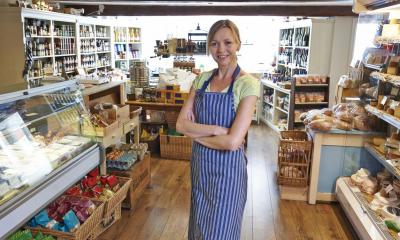
Independent fine food retailers cater for the growing demand from customers prepared to seek out and pay a premium for niche products and regional specialities. Check out our practical guide for starting and running your own delicatessen.
- Research your target market
- Decide what to sell
- Establish your customer profiles
- Promoting your business
- Fairtrade
- Buy an existing business
Research your target market
It's very important to research your market properly. Try to find out as much as you can about the level of demand for the products you intend to stock, and about how much competition there is to meet that demand.
Estimating demand
It's very important to find out whether there will be enough demand for a delicatessen in your area. Although consumers' tastes have become much more sophisticated, a wide range of delicatessen items can now be bought from most supermarkets (including discounters like Lidl and Aldi), many convenience stores and other large food retailers like Marks & Spencer. Also, supermarkets stock a wide range of ready-prepared continental-style meals so that shoppers don't even need to buy the individual ingredients in order to make up an adventurous and unusual meal. It's essential to differentiate your deli from the supermarkets - the Guild of Fine Food stresses the importance of capitalising on two major differences between independents and the supermarkets by stocking the best selection of quality products and ensuring that all staff can talk intelligently about them to customers.
Also bear in mind that consumers can now order a huge range of speciality fine foods by mail order and online.
First check out the competition in your area to identify how many other outlets are already selling delicatessen items. Think about the cultures and backgrounds of the people in your local area. It may be that you will only be competing directly against a few of these outlets because you plan to set up a very specialist type of store - for example you might be planning to stock mainly Italian, Spanish or Polish product ranges.
Visit as many competing outlets as possible to establish:
- what range of products and services they offer
- what prices they charge
- what are their opening hours
- what type of customer they attract
- whether their items are attractively displayed
- whether all the food looks fresh and appealing
- whether the premises and fittings are modern and hygienic
- how knowledgable and helpful their staff are
This might immediately show you that there is a gap in the market for a delicatessen specialising in a certain type of product.
Trade and wholesale customers
Don't overlook the possibility of supplying the catering trade, particularly if your area contains bars and restaurants which offer continental cuisine. For example, if you plan to offer a wide range of Italian fine foods and wines you could call on local Italian restaurants to see if they would be interested in placing a regular order. Perhaps you propose to make up some dishes yourself, such as patés. You could bring a few samples along to show the quality of your products to prospective trade customers. If you get a positive response you could have a trade price list circulated to local catering outlets. Don't forget to consider the cost of delivery when setting your trade tariff.
Check out future developments
The location of your outlet is very important. Ideally there will be plenty of passing trade as well as having ample and easy parking nearby. Check that there are no plans to build new road systems which would mean that traffic would bypass your shop, nor any proposals to impose parking restrictions nearby. Think carefully about the type of people you hope to attract - does your proposed location already attract this sort of customer? For example the immediate area might contain several up-market retail outlets or restaurants, or there may be concentrations of office workers who might be key customers.
Don't forget that market research can be ongoing. Once your delicatessen is open, talk to your customers. Find out what are their likes and dislikes and ask if there's anything they would like you to sell that you don't currently stock. Note down which products are popular and which ones don't sell well.
Research current trends, plus legal and tax issues
Decide what to sell
The range of products you decide to sell will probably depend on:
- the type of customer you're targeting. All delicatessens sell speciality ranges but some, because of the affluence of their customer base, stock very exclusive products such as foie gras and caviar
- whether you will concentrate on stocking items from a specific country, for example, all things Spanish, Italian or Polish - this may depend on the demographic of your local area
- whether you will specialise in certain product ranges such as cheeses, coffees, smoked meats and salamis, salads and so on
- how much room you have in your outlet
The range of products you might stock is very large, but you will probably sell some or all of the following:
- cold meats, salamis, patés - these may come from all over Europe and you may decide to produce some yourself
- selection of cheeses - generally both continental and British cheeses are stocked and cut for the customer
- fine groceries - such as pastas, sauces, oils, tinned goods, speciality teas and coffees and so on
- wet delicatessen - a wide range of items such as salads, olives, dips, smoked or soused fish, pickles, gherkins and so on
- made-up dishes - these could include items such as quiches, pizzas, samosas, pies, lasagne, stuffed vegetables and so on
- chocolates, cakes and biscuits - generally luxury continental ranges
- soft drinks such as fruit juices
- wines and spirits - if you're licensed to sell alcohol - these may originate from one or several countries depending on the delicatessen's focus
- ice creams, pastries and desserts
- exotic fruit and vegetables - if space permits
- items for the lunch time trade - such as speciality sandwiches, rolls or bagels. You might make these up yourself or buy them in ready-prepared
- packaged snacks like luxury crisps and nuts, and unusual specialities like biltong or beef jerky pieces
- bakery products - such as continental breads including ciabatta, focaccia and so on
- Fairtrade products such as teas, coffees, honey, exotic fruits and so on
Customers look to delicatessens to stock unusual, high quality foods - often the sorts of thing that are not easily available in the supermarkets. The Guild of Fine Food Retailers can help independent deli owners to source products not on sale in the mainstream supermarkets. You may well stock an extensive range of locally-sourced products and you might stock some organics. You could also consider stocking 'free from' products like gluten free and dairy free.
Most of the lines you stock will have a limited shelf life so you should make sure you monitor stock carefully and discount anything approaching its best before or use by date.
Your display should always look fresh and enticing so make sure you remove any items which look dried out or stale.
Services to offer
As well as stocking a selection of fine food, wines and spirits, you might also decide to offer a range of catering services to customers. For example:
- a full catering service for local businesses and members of the public
- café sales if you have enough room in your premises
- a luxury hamper delivery service
Seasonality
It is likely that you'll experience two main peaks in demand. Because many of the items you will sell are ideally suited to quickly prepared salad-type meals the summer months are likely to be busy, particularly if the weather is good. The period leading up to Christmas is also a good time for the delicatessen sector as people stock up on luxuries for the Christmas festivities. Many items will be bought as gifts so try to make sure your stock includes suitable products. You might consider putting together a range of hampers containing different selections of food and wines.
Establish your customer profiles
Delicatessen customers are typically people who care enough about the food they eat to make a bit of an effort to visit a specialist and - in most cases - pay a bit extra for something out of the ordinary. They are often reasonably affluent with a fair amount of disposable income to spend on non-essentials. It's common for a deli to build up a core of regular local customers who visit the shop quite frequently.
If your deli includes a cafe and/or takeaway counter then your customers might also include tourists and day trippers, students, working people on their lunch break, local retired people and shoppers.
Some delis target a particular section of the local community - for example Polish residents or Italians who live in the area. They stock a range of products from a particular country which appeal to people looking for reminders of home, and often serve as a meeting place for community members - particularly if they incorporate a cafe.
Trade sales
You might decide to try and target wholesale and business customers like hotels and restaurants in the area. Some of these may be interested in buying wholesale stocks of products like meat and charcuterie, patés, cheeses and so on, as well as certain ready-made pies, quiches and other dishes.
Special offers and discounts
You may decide to target a particular type of customer by offering special deals and discounts. For example, you could offer discounts to pensioners on certain mornings, or lunch-time meal deals to attract workers and students. You might also consider running a loyalty scheme to encourage regulars. If you have any wholesale customers then they may well expect you to offer them special trade discounts for buying in quantity on a regular basis.
Promoting your delicatessen business
The right image
It's really important that your delicatessen projects the right image to customers. Everything about the way your outlet looks and feels should be designed to encourage existing customers to keep coming back regularly.
It's probably important to make the outside of your outlet as bright and as attractive as possible. Try to make sure that signs are professionally made, clean and in good condition. Use colours, lettering and designs that you feel put across the right image for your delicatessen. Bear in mind that things like keeping your windows spotlessly clean and the condition of paintwork can make the difference between a delicatessen that looks like it's up and coming and one that looks old and run-down.
You'll probably be selling a very wide range of luxury items to a discerning customer base. They will want high quality, unusual products and they will also expect everything they buy to be in perfect condition. Your display of charcuterie, loose cheeses and wet delicatessen items can be one of your most powerful marketing tools, enticing customers to sample a wide range of different products. However, all the items must be maintained in a first class state. Dry ends of salamis should be sliced off regularly, discoloured slices of meat disposed of hygienically and so on. Keep everything scrupulously clean - remember that the supermarkets are your main competitors and all shoppers are familiar with the hygienic appearance and high standards of their fresh food counters.
Your staff also play an important role in the image of your delicatessen. Customers will expect them to be knowledgeable, friendly and helpful. It could be a good idea to have a basic staff uniform. Always bear in mind that maintaining high quality standards of food preparation and service is vitally important in gaining repeat custom.
Advertising and promoting your delicatessen
With a delicatessen shop to be proud of, you'll want to make sure that your potential customers know about you and the products and services you offer.
There are a number of things you can do to promote your deli:
- advertise in your local newspaper and any local directories. Why not advertise in 'What's on' type publications, particularly those featuring cultural activities (theatres, galleries, museums and so on) likely to appeal to your target market
- launch your own website
- use social media
- get listed in online directories such as Google My Business and Yell.com and on other websites that have links to speciality and fine food businesses
- make sure your window display is exciting and changes regularly. Maybe you could have promotions featuring products from different countries, including local regional specialities
- offer free samples on the counter to entice customers to try new things
- have leaflets and price lists printed to circulate to local catering businesses, or to offices nearby
- encourage repeat business by offering tastings and giving customers recipes
- attend and participate in local and regional events like food fairs and festivals
Remember that your vehicles can be an excellent advertisement for your business if you have them attractively sign written and keep them looking clean and smart.
Fairtrade
Recent years have seen an increase in demand for ethical products that help producers and farmers in the developing world. You could meet this demand by stocking a range of Fairtrade products such as teas, coffees, honey and so on. This would show potential customers that your business is ethically aware and committed to fighting global poverty. Offering Fairtrade products can also be a good way to differentiate your business from its competitors.
What is Fairtrade
Fairtrade guarantees a fair deal for disadvantaged producers and farmers by making sure they receive a fair price for their work and goods. Fairtrade items are generally slightly more expensive than similar products - but more and more people are happy to pay a little extra to help producers become self-sufficient. All Fairtrade products are marked with the easy to recognise Fairtrade Mark and there is a huge range available.
How does the Fairtrade system work
The Fairtrade system works by paying producers a set minimum price for their goods, giving them a living wage. On top of this, producers also get an extra sum of money to invest in their business or community. This is called the 'social premium'.
In return, Fairtrade producers must meet certain standards. These are set by Fairtrade International. Only licensees, such as importers and manufacturers, that are registered with the Fairtrade Foundation can apply the Fairtrade Mark to a product. So you'll probably buy your Fairtrade goods either direct from manufacturers or importers or - more likely - from registered wholesalers and distributors in the UK. The Fairtrade Foundation website has a list of wholesalers throughout the UK that sell Fairtrade marked products to retailers.
Pricing Fairtrade products
When you buy Fairtrade goods from a wholesaler or registered manufacturer, you can probably expect to pay a little more than you normally would for similar products. The slightly higher trade prices cover the set price and social premium that are paid to the farmer or producer, as well as supply chain costs and the cost of certification and product licensing.
Although trade prices for Fairtrade products are higher, you can probably charge your customers a little bit more for them. You may benefit from extra sales, too. The Fairtrade Foundation isn't involved in setting retail prices, so the mark-up you add is entirely up to you. While you'll want to cover your costs and retain a healthy profit margin bear in mind the purpose and aims of Fairtrade when you set your prices. The Fairtrade Foundation makes it clear that profit margins on Fairtrade items shouldn't be higher than on similar products.
Promoting Fairtrade goods
Offering Fairtrade products can be an attractive selling point for your business and can help to attract ethically aware customers. So it's important to make sure that potential customers know about the Fairtrade products you stock.
The Fairtrade Foundation is responsible for promoting Fairtrade in the UK and can provide useful materials and advice to help you to advertise your Fairtrade ranges. Any promotional materials that contain the Fairtrade Mark, like posters or leaflets, must be approved by the Foundation.
The Fairtrade Foundation organises a Fairtrade Fortnight each year to promote the Fairtrade system. This could be a good time for you to raise customer awareness about the Fairtrade products that you offer. For example, perhaps you could hold a Fairtrade tasting evening. You could also put up posters in your outlet promoting the benefits of Fairtrade and informing customers what Fairtrade products you stock.
Where to find out more
The Fairtrade Foundation is part of the international Fairtrade movement and oversees all aspects of Fairtrade in the UK - including retailing. For more information on Fairtrade, the range of products available and how you can get involved visit the Fairtrade Foundation website.
Buy an existing delicatessen business
You might decide to buy an existing delicatessen business rather than start your own venture from scratch. Buying a going concern can mean that:
- the premises, business equipment and shop fittings are already in place
- there are established customers
- the business can generate income immediately
- suppliers have been identified and relationships established with them
- the business has a track record, which can help if you are looking for finance
- staff may already be in place
However, look critically at any business that you are interested in to make sure that the price you negotiate with the seller is a fair one. Try to establish why the business is for sale - for example, is the owner keen to retire or is there another personal reason for selling up.
Your market research into the sector as a whole and the locality in particular will help you to establish whether or not the owner is selling because he or she can no longer generate enough income from the business. This may not necessarily deter you - many business people are confident that they can turn a failing business around. The important thing is to have established the current position so that the price you pay for the business is not too high.
Other matters to consider include:
- the state of the premises, fittings, equipment and so on. Will you have to spend money refurbishing or replacing assets, or to bring the premises up to standard for food hygiene purposes
- the condition and value of any stock you are buying. Check this over carefully before agreeing a price - make sure that all products are well within their 'sell-by' dates
- is the existing owner prepared to give you some training after you take over
- existing staff rights
- how to retain key personnel once you've taken over
- does the business owe money that you will be responsible for
- if you are paying for goodwill, to what extent does this depend on the skills and personality of the seller
Try to find out as much as possible about the business's reputation. Is it rated on the TripAdvisor website, or reviewed on Google My Business - and if so what do reviewers think of it? Has it recently failed any food hygiene inspections? Are there any actions or enforcement orders still outstanding?
Ask your accountant to look critically at the business accounts for the past three years and discuss with him or her the selling price in the light of what the accounts reveal. Make sure you budget for other professional fees such as legal fees and valuation and survey costs.
Franchises
Franchising can be a good 'halfway house' between starting out from scratch and buying an existing business. If you purchase a franchise you'll still be setting up your own business, but you could benefit from the experience, resources and brand name of a business that is already successful.
There are several franchises available in the deli, fine food and related sectors. Although different schemes vary in detail, most feature the following key points:
- as a franchise holder, you will remain self-employed but will use the identity (corporate colours, logos, trade name and so on) of the franchisor
- in return, you will pay the franchisor a fee - this might be a one-off investment, a monthly charge, or a combination of both
- both you and your franchisor will have to fulfil certain obligations and maintain certain minimum standards
Some franchisors will provide you with any specialist training you require, help with advertising and marketing, and advice and support on a range of business and technical matters. You'll normally be expected to purchase most or all of your stock from your franchisor.
Details of the above points are set out in the franchise agreement or contract, which both you and your franchisor will sign. The agreement will also deal with other matters, for example any territorial exclusivity due to you and the minimum period for which the franchise will run.
Before entering into a franchise agreement, it is advisable to compare the terms of different franchisors to be sure that you are getting a good deal. Go through the contract with your solicitor before signing anything. More information about franchising is available on the Franchise Info website. Information is also available from the British Franchise Association (BFA).



